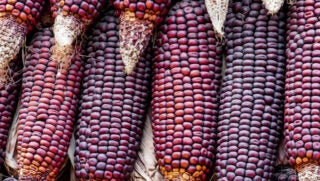The food supply chain will be able to withstand the COVID-19 pandemic and continue to feed Americans across the country, two Virginia Tech agricultural economics experts said.
The demand for the U.S. food supply chain will shift from restaurants to grocery stores, compensating for the increased reliance on eating at home, said Olga Isengildina-Massa, associate professor in the Department of Agricultural and Applied Economics in the College of Agriculture and Life Sciences. This comes as the dairy industry and other grower sectors have talked about having to discard bulk loads of ag products in the early part of this shifting demand away from large-scale restaurant ordering.
“I don’t anticipate any problems with running out of food,” Isengildina-Massa said. “No one is stopping growing crops or raising livestock, and our fundamental agriculture industry is still going strong.”
The stock-outs, or empty shelves, at grocery stores are a good sign for farmers and growers that illustrate that people are still consuming a variety of food and fiber products.
“I think these shortages are temporary, and I think all involved in the agriculture and food sector are working hard to fulfill consumers’ demand for food,” said Mary Marchant, a professor in the same department. “For corn, soybeans, fruits and vegetables, and other crops, we’re just at the beginning of planting season. Much of the nation’s food supplies for grocery stores are either in storage or within the food supply chain and just need to be processed or delivered.”
The U.S. Department of Agriculture has said that “there are no nationwide shortages of food, although in some cases the inventory of certain foods at your grocery store might be temporarily low before stores can restock. Food production and manufacturing are widely dispersed throughout the United States, and there are currently no widespread disruptions reported in the supply chain. [The] USDA and Food and Drug Administration are closely monitoring the food supply chain for any shortages in collaboration with the industry and our federal and state partners. We are in regular contact with food manufacturers and grocery stores.”
Consumers are adjusting habits during the COVID-19 pandemic. Food eaten away-from-home had surpassed food eaten at home in the United States a few years ago, and the COVID-19 pandemic has caused a return to more food eaten at home.
“The food supply chain is familiar with consumption in this manner,” Marchant said. “The supply chain will adjust to the shift away from restaurants and consumers will see a higher flow of supplies to grocery stores.”
Furthermore, the recently passed Coronavirus Aid, Relief, and Economic Security, or “CARES” Act, provides a cushion that will help the agriculture industry in the current economy, Isengildina-Massa said.
“Temporarily empty shelves are highlighting the essential role agriculture and agribusinesses play in sustaining our well-being. As long as the processing plants keep running and transportation companies can carry the products to their destinations, our food supplies will remain uninterrupted.” Isengildina-Massa said.


